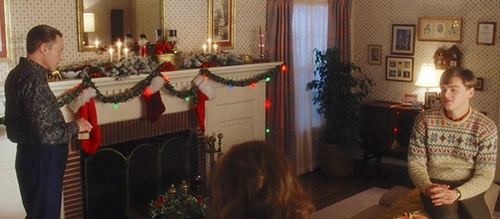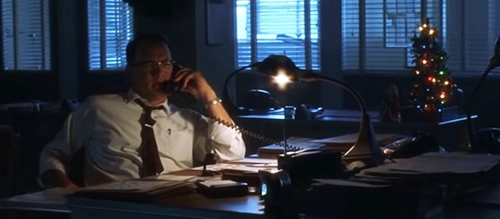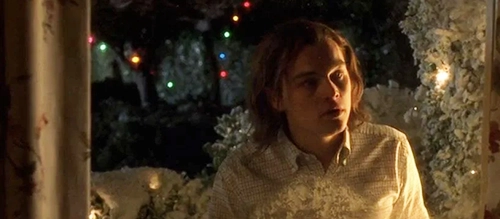Catch Me If You Can: Christmas Classic?

According to Screencraft, there are six essential elements to a Christmas film: nostalgia, magic, family, atmosphere, hope, and redemption. These can all be easily applied to festive classics we know and love, such as the iconic It’s a Wonderful Life (1946), the joyous Elf (2003), and the British household staple Nativity! (2009).
Even so, there has been debate upon debate about whether certain films can be entered into the yuletide Hall of Fame, the most prominent of these being Die Hard (1988). One film that should be considered but seems to fly under the radar is Steven Spielberg’s 2002 crime caper and comedy-drama Catch Me If You Can.
Released on Christmas Day, the film is based on the true story of how teenager Frank Abagnale Jr. (Leonardo DiCaprio) successfully pulled off confidence schemes worth millions of dollars by impersonating a pilot, a doctor and a lawyer, all whilst evading the clutches of FBI agent Carl Hanratty (Tom Hanks).
Doesn’t sound very Christmassy, right? Wrong!
Spielberg’s caper immediately establishes the film’s sense of nostalgia through its period setting of the 1960s. We are transported back in time to when banks didn’t have high-tech security, Pan Am was the kingpin of American air travel, and Frank’s ugly orange knitted vest was considered fashionable. These are all nostalgic for the people who grew up in and around the 1960s, and that group would have been the target audience for this film back in 2002.
The film’s sense of nostalgia still holds up today. There is a scene in which Frank, in the midst of his pilot con, goes to the cinema to watch the iconic James Bond film of the era Dr. No (1962), then it cuts to him having a suit measured. What name does he give the tailor? Ian Fleming, the author of James Bond.

In a way, it’s magic. Which is, of course, a key ingredient of a Christmas film.
Whilst the magic isn’t depicted in the stereotypical manner of wizards and fairy dust, Frank is represented as an immoral magician, right from the moment he steps into his classroom in a new school and hoodwinks his class into thinking he is the substitute teacher. We buy into the grand scale of Frank’s ongoing mastery of disguise and sleight of hand, and it makes for entertaining viewing even if certain elements of the true story have been widely disputed.
As with most Spielberg films, one of the central themes is a broken home and the effects it has on the children involved. If anything screams “Christmas film” it’s the idea of family and themes of reconciliation and repairing broken relationships.
We are introduced to the tight-knit Abagnale family, with Frank Sr. (Christopher Walken) receiving an award as his wife Paula (Nathalie Baye) and son Frank watch on in admiration. We then cut to a scene in which Frank watches his parents dancing by the family Christmas tree, as Frank Sr. recounts the story of how he and Paula met. From here, the idyllic family life takes a turn when Frank Sr.’s tax problems and Paula’s affair ultimately lead to their divorce. Upon being forced to choose which parent to live with, Frank rebels by running away from upstate New York to the City, thus kickstarting his career as a high-stakes con artist.
Throughout the film, we see Frank meeting up with his father, hoping that the money he has made will convince his parents to reconcile and make their living situation go back to the way it was. Frank Sr. resists this idea, having moved on and accepted what happened. This upsets Frank, who plunges deeper and deeper into his scams.
The film’s heartbreaking climactic moment comes years later, as Carl tells Frank that his father has died whilst they are flying back to the US. Distraught, Frank escapes the plane and finds the house of his mother, who has a new family. This prompts Frank to finally stop running and to surrender to Carl and the FBI.

In the climax, Frank sees his mother’s new family on Christmas Day, where there are fairy lights and a tree just like the one in the start of film. He looks on through the window, excluded from the life he used to have and desperately longed to have back. The beautiful tones of Nat King Cole’s “The Christmas Song” underpin the emotional weight of the scene, with the warmth of the classic song heavily contrasting Frank being left out in the cold.
Christmas Eve itself is a recurring motif throughout the film. Frank calls Carl to provoke him to send a team to chase him and apologise for their last encounter. Carl sees through this, realising that Frank has nobody to talk to. A few years later, Frank calls Carl on that day to tell him that he wants a truce, as he is getting married. Carl declines, saying that he will be caught and put in prison. Their final interaction on this day comes when Carl tracks Frank down to Montrichard, where his father met his mother on Christmas Eve. Frank is subsequently arrested by French police.
Hope is another seasonally relevant key theme throughout Catch Me If You Can, as Frank’s schemes are based upon his hope that the rewards will prompt his parents to get back together. The naivety of this notion makes the film’s climax all that more heartbreaking. Leonardo DiCaprio’s performance in this regard is phenomenal, as he is able to shape-shift from a cocky kid playing the part of an adult into an anxious young boy going through a traumatic change in his life when he is on the brink of adulthood. It is certainly a gamble to cast a 32 year-old as a 16 year-old, but it paid off. Spielberg is able to utilise the actor’s talents to convey this loss of childlike hope over time, presenting a type of coming-of-age we often see in Christmas films like Elf and Meet Me In St. Louis.
At the end of the film, after Frank is sentenced to 12 years in prison, Carl offers him an opportunity for redemption, as he realises that Frank’s conning skills can be utilised to help the FBI detect fraud. Frank accepts serving the rest of his sentence by working at the FBI, but finds that an office job is incredibly tedious. Frank prepares to impersonate a pilot one last time, but Carl finds him in the airport, saying nobody is chasing him. He tries to question Carl about his family, as Carl reveals that he is the father in a broken home, with a daughter not much younger than Frank himself. At that moment, we think Frank is going to go through with the con, but he appears back at the FBI and the film ends with him and Carl discussing one of the cons in great depth. This is a bright, feel-good ending reminiscent of any number of great Christmas films, and one that arguably ties their father-son-like relationship together, revealing to us a found family staple of a deeply unconventional nature but a wholly Christmas one nonetheless.
Written by Grace Laidler
Follow Grace Laidler on Twitter: @gracewillhuntin

